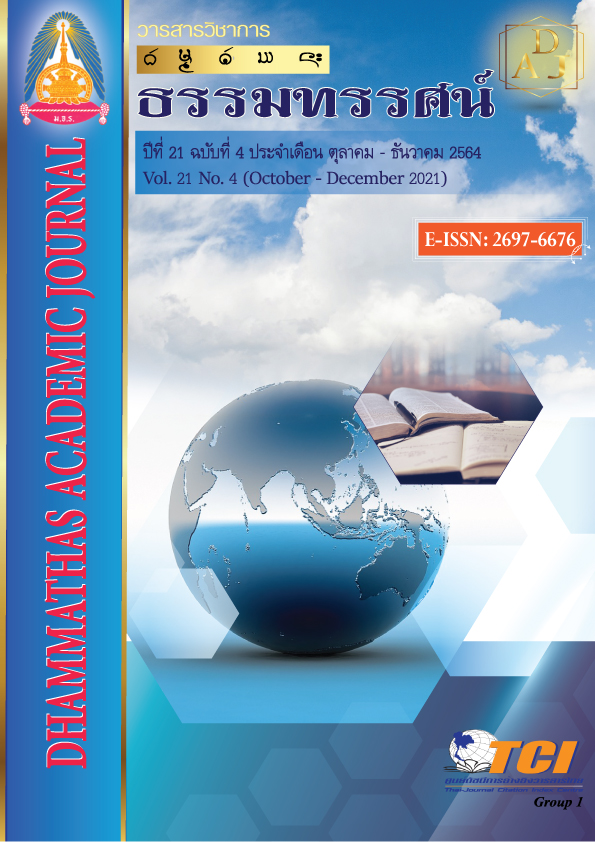The Model of Teacher Development in Learning Management for 21st Century for Educational Opportunity Schools under Khon Kaen Primary Educational Service Area Office 3
Main Article Content
Abstract
The objectives of this research were to: 1) study the components and indicators of learning for 21st century, 2) study the current and the desirable state of developing learning for 21st century for educational opportunity expansion schools under Khon Kaen primary educational service area office 3, 3) create the model of teacher development in learning management for 21st century and 4) study the results of the experimental model. The research was divided into four phases as follow; Phase 1; study the components and indicators of learning management for 21st century, with 9 experts. Phase 2; study the current and the desirable state of learning development for 21st century. This was done by working with 237 school administrators and teachers, the research instrument was questionnaire, confidence of the whole questionnaire .79. Phase 3; create the model of teacher development in learning for 21st century, this was done by a group of 9 experts for focus group discussion and 9 experts for Connoisseurship and Phase 4; study the results of using the model with target group of 16 people.
The results found that:
1. The components of learning management for 21st century consisted of 4 major components and 15 minor components and 79 indicators including child-centered learning, Learning technology base learning, development of Management system and, formative evaluations.
2. The current state in overall was at high level and the desirable state in overall was at the highest level.
3. The model components comprised principles, objectives, content activities, development process and assessment. The result of evaluation for accuracy, propriety, feasibility and utility was at the highest level in overall.
4. The results of using the model of teacher development in learning for 21st century for educational opportunity expansion schools under Khon Kaen primary educational service area office 3 was at the highest level and satisfaction was at the highest level.
Article Details
References
คุณาพร วรรณศิลป์. (2559). การพัฒนาหลักสูตรฝึกอบรมครูด้วยรูปแบบผสมผสาน เรื่องการทำวิจัยในชั้นเรียน. (วิทยานิพนธ์ครุศาสตรดุษฎีบัณฑิต). มหาสารคาม: มหาวิทยาลัยราชภัฏมหาสารคาม.
ฉัตรชัย หวังมีจงมี และองอาจ นัยพัฒน์. (2560). สมรรถนะของครูไทยในศตวรรษที่ 21: ปรับการเรียนเปลี่ยนสมรรถนะ. วารสารสถาบันเสริมการศึกษาและทรัพยากรมนุษย์, 12(2), 47-63.
ชิรวัฒน์ นิจเนตร. (2560). การวิจัยพัฒนารูปแบบทางสังคมศาสตร์และการศึกษา. วารสารราชภัฏสุราษฎร์ธานี, 4(2), 71-102.
บุญชม ศรีสะอาด. (2553). การวิจัยเบื้องต้น. กรุงเทพฯ: สุวีริยาสาส์น.
พัฒนา พรหมมี, ศรีสุรางค์ เอี่ยมสะอาด และปณิธาน กระสังข์. (2560). แนวคิดการสร้างและพัฒนารูปแบบเพื่อใช้ในการดำเนินงานด้านการสาธารณสุขสำหรับนักสาธารณสุข. วารสารวิชาการสมาคมสถาบันอุดมศึกษาเอกชนแห่งประเทศไทย ในพระราชูปถัมภ์สมเด็จพระเทพรัตนราชสุดาฯ สยามบรมราชกุมาร, 6(2), 128-135.
ไพฑูรย์ สินลารัตน์. (2560). การศึกษา 4.0 เป็นยิ่งกว่าการศึกษา. (พิมพ์ครั้งที่ 4). กรุงเทพฯ: จุฬาลงกรณ์มหาวิทยาลัย.
วิทยากร เชียงกูล. (2559). เรียนลึก รูไว้ใช้สมองอย่างมีประสิทธิภาพ. กรุงเทพฯ: สถาบันวิทยาการเรียนรู้.
วีระภัทร ไม้ไหว. (2560). การพัฒนาหลักสูตรอบรมครูเพื่อพัฒนาทักษะชีวิตของนักเรียน ระดับประถมศึกษา โรงเรียนสังกัดกรุงเทพมหานคร. (วิทยานิพนธ์ศึกษาศาสตรดุษฎีบัณฑิต). กรุงเทพฯ: วิทยาลัยครุศาสตร์ มหาวิทยาลัยธุรกิจบัณฑิต.
สิริกร ไชยราช. (2562). การพัฒนารูปแบบการพัฒนาภาวะผู้นำครูในการจัดการเรียนรู้ตามหลักปรัชญาของเศรษฐกิจพอเพียง ในโรงเรียนมัธยมศึกษาสังกัดสำนักงานศึกษาธิการภาค 11. (วิทยานิพนธ์ครุศาสตรดุษฎีบัณฑิต). สกลนคร: มหาวิทยาลัยราชภัฏสกลนคร.
สำนักบริหารงานการมัธยมศึกษาตอนปลาย. (2561). แนวทางการดำเนินงานโรงเรียนมาตรฐานสากล. กรุงเทพฯ: ชุมนุมสหกรณ์การเกษตรแห่งประเทศไทย.
สำนักงานเขตพื้นที่การศึกษาประถมศึกษาขอนแก่น เขต 3. (2563). แผนปฏิบัติการประจำปีงบประมาณ 2564. ขอนแก่น: สำนักงานเขตพื้นที่การศึกษาประถมศึกษาขอนแก่น เขต 3.
สำนักงานเลขาธิการสภาการศึกษา. (2559). ปฏิรูปการศึกษาเพื่ออนาคตประเทศไทย มั่นคง มั่งคั่ง ยั่งยืน นโยบายด้านการศึกษาของนายกรัฐมนตรี (พลเอกประยุทธ์ จันทร์โอชา). กรุงเทพฯ: 21 เซ็นจูรี่.
_______. (2560). แผนการศึกษาแห่งชาติ พ.ศ. 2560-2579. กรุงเทพฯ: พริกหวานกราฟฟิค.
_______. (2562). มาตรฐานการศึกษาของชาติ พ.ศ. 2561. กรุงเทพฯ: 21 เซ็นจูรี่.
ศศิธร บัวทอง. (2559). การวัดและประเมินทักษะการเรียนรู้ในศตวรรษที่ 21. Veridian E-Journal, Silpakorn University, 10(2), 1856-1867.
อัษกร ตันฑกูล. (2563). รูปแบบการพัฒนาครูด้านการจัดการเรียนรู้ของโรงเรียนประชารัฐ ในภาคตะวันออกเฉียงเหนือตอนล่าง. (วิทยานิพนธ์ครุศาสตรดุษฎีบัณฑิต). ศรีสะเกษ: มหาวิทยาลัยราชภัฏศรีสะเกษ.
อมรรัตน์ เตชะนอก, รัชนี จรุงศิริวัฒน์ และพระฮอนด้า วาทสทฺโท. (2563). การจัดการศึกษาในศตวรรษที่ 21. วารสารมหาจุฬานาครทรรศน์, 7(9), 1-14.
อุบล วรรณพาด. (2561). รูปแบบการพัฒนาครูโรงเรียนมัธยมศึกษา สังกัดสำนักงานเขตพื้นที่การศึกษาจังหวัดร้อยเอ็ด. (วิทยานิพนธ์ปรัชญาดุษฎีบัณฑิต). กรุงเทพฯ: มหาวิทยาลัยนอร์ทกรุงเทพ.
อวยชัย สุขณะล้ำ. (2559). รูปแบบการเสริมสร้างสมรรถนะครูตามแนวคิดกระบวนการชี้แนะ (coaching) เพื่อพัฒนาความสามารถด้านการให้เหตุผลทางคณิตศาสตร์ของนักเรียนระดับมัธยมศึกษาตอนต้น. มหาสารคาม: มหาวิทยาลัยมหาสารคาม.
Kay, K. (2018). 21st century skills: Why they matter, what they are, and how we get there. In Bellanca, J., & Brandt, R. (Eds.), 21st century skills: Rethinking how students learn. Bloomington, IN: Solution Tree Press.
Likert, Rensis A. (1961). New Patterns of Management. New York: McGraw-Hill Book Company Inc.
USESCO. (2015). Education Quality Frame Work. Joint OECD-UNESCO Review of the Education in Thailand 2015.

